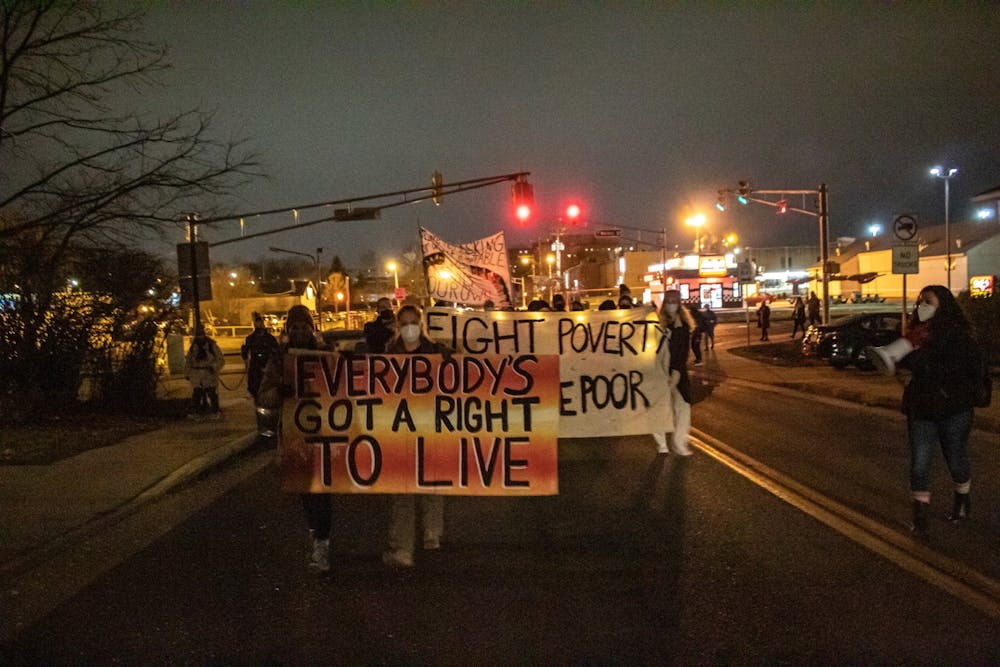The Bloomington City Council considered legislation to protect homeless encampments Wednesday, months after city officials began enforcing rules that require anyone setting up tents in a public space between 11 p.m. and 5 a.m. to have a permit. The renewed enforcement has facilitated the displacement of people experiencing homelessness who were staying at Seminary Park twice since December.
The ordinance under consideration would require city officials to take a series of steps before the city could displace people experiencing homelessness from camps. Some of those steps include the city providing storage for personal belongings and ensuring the displaced individual would be provided with transitional or permanent housing.
It is not yet clear exactly when a vote on the proposed ordinance, which would amend the Bloomington Municipal Code, will take place. A committee must vote on the legislation before it is presented to the full council.
Currently, there is no uniform approach the city is required to follow when it wishes to displace a person experiencing homelessness from a public space. This proposed ordinance aims to solve that problem by creating guidelines for when the city is allowed to displace a person and how it can be done. The authors — councilmembers Kate Rosenbarger, Matt Flaherty and Isabel Piedmont-Smith — said people experiencing homelessness are out of options.
“Where can people experiencing homelessness legally sleep when no shelter bed is available to them?” councilmember Piedmont-Smith asked city officials at the meeting.
Representatives from Mayor John Hamilton’s administration said finding a place for residents without other options to stay is not under the city’s purview.
“I'm not sure it's in the city's core service area to locate a place for people who are experiencing homelessness for a place to stay,” Deputy Mayor Mick Renneisen said.
[Related: Left in the cold: Members of Bloomington’s unhoused community describe hostility, danger]
This new legislation is based on an Indianapolis ordinance from 2016 that addressed similar issues of homelessness in the state’s capital. Despite being a key stakeholder in the community, Rosenbarger said IU was not consulted prior to this meeting.
This proposed ordinance has garnered support from multiple organizations in the community, including the Bloomington Homeless Coalition.
Councilmembers questioned both the proposed ordinance authors and city officials about the potential economic effects of this legislation.
Councilmember Flaherty told the council he does not foresee much of a financial burden on the city, though city officials said the costs of storage for personal items and construction of restrooms could exceed $200,000. Restrooms may need to be constructed under the proposed ordinance, city officials said, because it requires any designated space for unhousd residents to have access to restroom facilities.
Hamilton’s administration opposes this legislation, Bloomington Director of Public Engagement Mary Catherine Carmichael said.
“We don't feel it's in the best interest of the community to pass it,” Carmichael said. “Opposition to this ordinance in no way translates to opposition to those people experiencing homelessness.”
Philippa Guthrie, corporation counsel for the city, said the legislation was overly broad in some areas and it would be too difficult for the city to uphold its obligations because of financial costs and logistical issues.
“In summary, we believe this ordinance is not sufficiently thought through with input from all the necessary parties who should be involved,” Guthrie said. “It's well intentioned, obviously, but we don't believe it will improve our community's ability to address homelessness, or to come up with longer lasting solutions.”
[Related: Bloomington Chamber of Commerce opposes ordinance on homeless camp protections]
The Ninth Circuit Court of Appeals ruled in April 2019 that the City of Boise could not enforce criminal penalties on unhoused individuals sleeping outside without any adequate alternative. Bloomington’s situation does not apply to that case because no criminal penalties have been submitted against Bloomington’s unhoused individuals, Guthrie said.
According to an Indiana Daily Student report earlier this month, people in Seminary Park feared arrest from the Bloomington Police Department if they did not leave Seminary Park before it was cleared in January. Bloomington Police Department Chief Michael Diekhoff said Wednesday that unhoused individuals could be arrested for trespassing if they were in public parks outside of allowed hours. Thomas Westgard, a member of the public, also said the police threatened to arrest people staying at Seminary Park outside of those hours.
The legislation says displaced individuals need to be offered either transitional or permanent housing if they are displaced from a camp, but Hamilton said in a statement read at the meeting that this isn’t an option because it is not possible to generate new transitional or permanent capacity quickly without new funding. Hamilton did not speak at the meeting.
The Greater Bloomington Chamber of Commerce announced its opposition to the proposed ordinance Tuesday. One member of the chamber, in agreement with Hamilton’s statement, suggested it would attract more people experiencing homelessness to Bloomington.
[Related: OPINION: Bloomington’s Chamber of Commerce confirmed it hates the unhoused community]
Councilmember Rosenbarger refuted this point in the proposed ordinance’s introduction, showing data from Indianapolis that showed there was not a noticeable increase in the number of people experiencing homelessness in the city after their city council passed their ordinance in 2016.
Perry Township Trustee Dan Combs said he was disappointed with the discussion.
“What I keep hearing is, ‘Let's slow down on what progress this ordinance proposes in search of perfection,’” he said. “And that troubles me greatly because that's a great way to deflect from the entire issue and put it off. And the reason I say that is because I went to my first meeting on homelessness in 1988.”




